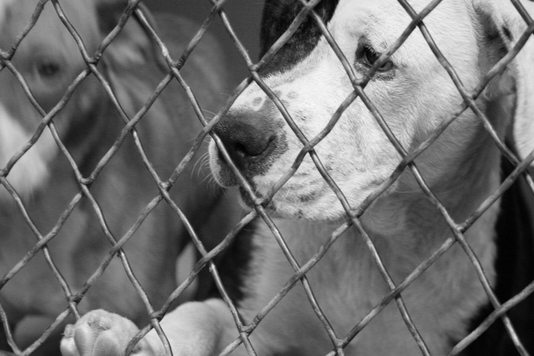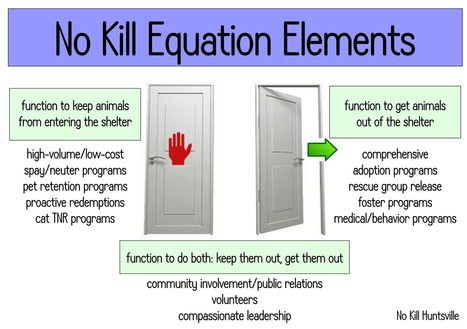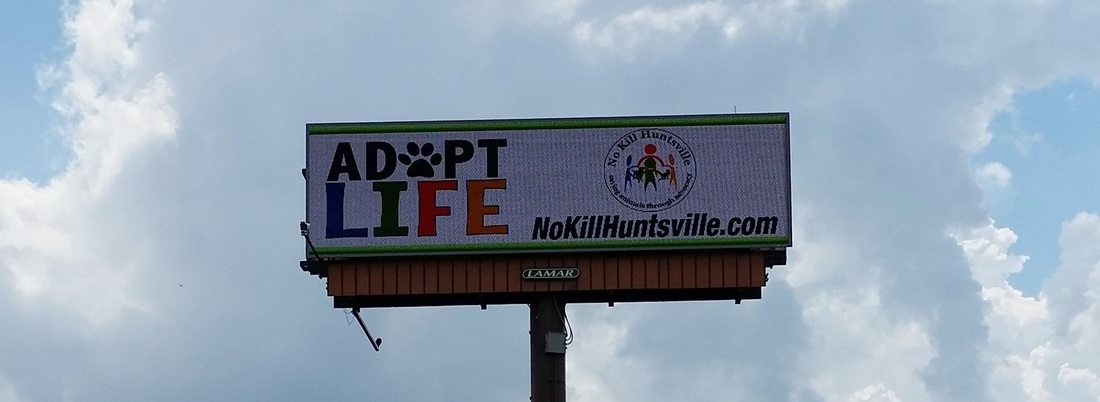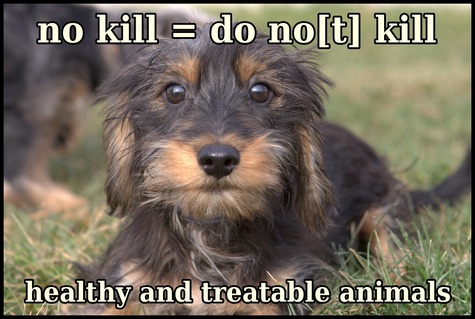|
Let's talk about words today. More specifically, let's talk about one word: euthanasia. We read a number of media reports late last week about the fact that our shelter planned to euthanize animals for space if people did not come to adopt them. We fully understand that the shelter needs to communicate with the public about placing animals when the shelter is near capacity. In that regard, we encourage Huntsville Animal Services to be completely transparent about what is happening. We find improper use of The E Word related to population reduction to be both offensive and irresponsible.
The dictionary definition of euthanasia is simple: the act or practice of killing or permitting the death of hopelessly sick or injured individuals (as persons or domestic animals) in a relatively painless way for reasons of mercy. When we destroy animals who are suffering or are irremediably ill, that is, in fact, euthanasia. Destroying healthy and treatable animals is not euthanasia. It is not merciful, it is not beautiful and it is not necessary. It is not "putting them down" or "putting them to sleep" or preventing "a fate worse than death." We use those phrases - and many use the word euthanasia - to sugar coat the reality of the act. And because we have allowed ourselves to become callous to, or complacent about, killing of shelter animals, we accept that word because it makes us feel better somehow, as if we did a good thing. When we destroy healthy and treatable animals we are doing just that. We are destroying them and we are killing them. If you have ever made the heart-wrenching decision to euthanize a beloved pet which was genuinely suffering or so ill that any treatment would likely causer more pain or suffering, you know exactly what euthanasia means. To compare the euthanasia of your companion to the destruction of a healthy or treatable animal for space or convenience serves only to devalue both of those lives. And any person who ever lost a beloved pet to an "oops" killing at an animal shelter would not say their dog or cat was euthanized. In No Kill communities, healthy and treatable animals are not destroyed. Period. They are saved. And words are used for what they mean. Let's stop calling this anything but what it is. Once we do that, we can have a realistic conversation about what takes place in our shelter and we can take a look at why population control killing is still an option here even though many people believe that Huntsville is already a No Kill Community. It is not. When we met with a city official in early June to ask the city to commit to no longer destroy healthy and treatable animals, the answer we received was, "no. The city will not commit to that." We later wrote a letter to the Mayor and City Council to ask for a commitment. Our letter has gone unanswered.
0 Comments
As we have written about before, Huntsville is getting a lot of attention these days across the country as a result of the progress made at our municipal animal shelter which serves both the city and the county: Huntsville Animal Services. Shelter animals are now safer here than they have ever been in the history of the community as save rates have reached and then exceeded 90% of all shelter intake. Huntsville is being referred to as an example of what can happen in any community when a concerted effort is made to balance public safety with animal welfare. There are some aspects to our community which are not found in other places like the fact that Huntsville is a very progressive, high-tech military town which supports the space program. There are other local challenges which are faced in many other communities like the fact that we have a lot of pit bull-type dogs, many of which are not socialized to people. We think everyone can agree that in spite of differences between communities, saving the lives of animals is more about a culture than it is about an exact methodology or a cookie cutter solution. Once everyone decides that saving the lives of healthy and treatable pets is a priority right now, that is really the first step toward change. We have always promoted the no kill equation as a methodology just because it can be molded and shaped to fit any community. Any city or county which genuinely wants to end the practice of destroying savable animals need only do some introspection on what is happening now in order to work on program development using existing funds and resources. In some places, change can happen virtually overnight. In other places, it takes some time, some planning, some coordination and a lot of effort to make it happen sooner rather than later. We have been asked to help advocates outside our own community understand more about what happened here in order to help achieve similar results in their own community. We are more than happy to share in a lessons learned kind of way. We will not set out the specific history of what happened here chronologically; it took years for change to begin to happen and in the end, too much information is just that. We hope that reading about our activities in Huntsville will help other advocates develop a plan and work toward that plan while avoiding some of the mistakes we made here. We are not yet a no kill community as far as the members of our coalition are concerned. We see the measure of that as not one of numbers or percentages but a standard in which healthy and treatable pets are not at risk under any circumstances. But things have changed drastically here and we know we have been part of that change. We also must acknowledge the drastic changes put into place by officials with the City of Huntsville and Huntsville Animal Services with the help of rescuers, volunteers, foster homes, adopters and the animal-loving community here. It takes a lot of courage to try new things and risk failure in the process. We are sure that working at Huntsville Animal Services is an entirely different experience than it was for the shelter director and staff a couple of years ago and we genuinely applaud them for the progress achieved. We wish the very best to any person or any coalition which advocates to save the lives of shelter animals. Sometimes the only thing standing between animals and certain death is the voice of dissension which says loudly and clearly, "no. This is not consistent with our values and our culture." Decide what you want. Ideally, you should be able to state your goal in a single sentence. You cannot fix our entire society or even an entire community in one fell swoop or through magic thinking. You cannot address issues related to companion animals, farm animals and wildlife at the same time. In our case, we wanted to push Huntsville to stop killing healthy and treatable animals in the tax funded shelter. We explained what we considered our vision on our website. Do your research. If you don't know what you're talking about, you'll never make any headway because you'll have no credibility. You need to become an expert on your vision so you can speak intelligently about it from the hip. Learn the history of the issue you are working on so you know how our society got to this point. Make a decision on what methods you think work best to accomplish the goal, while being prepared to acknowledge that there are other methods which may have value. Network with people who have walked your path before you and whom are considered subject matter experts. You don’t need to be the smartest kid in the class as long as you know the smartest kids in the class. In our case, we promoted the no kill equation from the start. We did local research to learn what was already taking place in our animal shelter and in our community. We also networked with successful no kill communities across the country by phone and email to learn what they were doing related to specific no kill programs. The end goal was to share our research with the city, which we did. Find a few like minded people to stand with you - but not too many. It is incredibly rare for a single person to be effective in an effort to make things better for animals and with no support when it comes to addressing systemic issues, particularly with local governments. It's just too easy for you to be dismissed as naive or as a zealot. You will likely be able to do more good if you find like-minded people who share your vision and are willing to join you to speak with one voice. Don't make your group larger than it needs to be for the sake of numbers. You run the risk of ending up with people who say they share your values but who truly do not or who talk but don’t do. Those people can be incredibly disruptive and take you way off course, wasting valuable time and energy. In our case, we began with about 30 members who were invited to participate. People either left the group or were removed over time for being disruptive and not sharing the same vision. We currently have 6 core members of our group and we do speak with one voice. Try doing "the ask" at the very beginning. If you are trying to reform the way your local animal shelter functions, diplomacy and respect are key and you simply must take the high road even if that behavior is not reciprocated. We have heard many times that all advocates are abrasive and are too quick to engage in name calling and assigning blame from the start. We are just not that way at all because we felt it was just not productive. If you do not approach those who have the power to change the situation and simply ask them to consider doing so, you run the risk of offending them unnecessarily. Go straight to the source as your first step. In our case, one of our members paid for our shelter director to attend a No Kill Conference back in 2009 in hopes that she would proactively develop programs to save lives. After our coalition formed, we arranged for the director to receive free and confidential help from subject matter experts with us paying the expenses. The offer was refused at a time when the live release rate at our shelter was 41%. That refusal, unfortunately, set the stage for the next four years. Had the offer been accepted, much of our advocacy would not have been necessary at all. Don't waste time or energy on someone who doesn't care or won’t listen. There is no polite way to tell someone "animals are being destroyed needlessly. Please stop." But anyone who is really interested in saving the lives of animals, as opposed to defending that outdated process, will quickly let you know that they are interested in learning other ways to function and are "all in" toward embracing new ideas, particularly if you can help them understand what methods have worked in other places. You cannot force someone to acknowledge your vision and to work with you if they are bound and determined not to do so. If you hit a wall, don’t keep banging your head against it. Find a way around it by involving the general public in your efforts. That is what happened in Huntsville. After the offer of free help from experts was refused, we took our subject to the public. We hosted a petition on Change.org which we augmented with signed petition pages and we held a free no kill workshop for the public to introduce them to no kill philosophies and programs. We had been told the shelter director would attend with her staff. She did not. The county animal control director did attend. Make your message one about ethics, money and accountability - not about specific people. All animal shelters function with some oversight. In the case of municipal animal shelters which are operated by a city, county or by a contracted nonprofit, those shelters are funded by tax dollars. If your argument is that animals are being needlessly destroyed, you do better to argue that doing so is not consistent with American values, is not a good way to spend money and that those who oversee the shelter are accountable to the people who are paying for it: the public. Even if you believe that a shelter director should be removed, you won’t get far suggesting that unless some actionable form of abuse is taking place. You are better off focusing on the leadership as a whole. If the leadership makes personnel changes, so be it. In our case, we hosted a series of electronic billboards at different locations around town for a period of months using a series of empowering slogans like “we are progressive enough to be a no kill community” and “saving shelter pets reflects our values.” We also showed the documentary film “Redemption: The No Kill Revolution in America,” at a local high school in order to reach a wider audience with our topic. Invite the public to participate in the process. Although most Americans love animals and want the best for them, many people feel powerless to do anything as individuals to bring about change. Studies have shown that the vast majority of the public believes that the destruction of healthy and treatable animals in animal shelters is unethical and should be illegal. It is important not just to advocate for animals yourself or as part of a coalition, but to bring the public to the table. A few voices may be heard to a degree or may be dismissed out of hand as naive or uninformed. When the voting public begins to speak out to officials about what they want done with their tax dollars, it can be much more effective. Even people who don't share their homes with animals or particularly like animals likely do not want their tax dollars used to destroy animals when those same dollars can be used to save them and bring about systemic change. In our case, we not only took out subject to the public using the media, billboards and periodic events (like our workshop and showing the no kill documentary film at a local high school), we also encouraged people to speak out as individuals to tell local officials what they want and why. We set up pages on our website to help them find contact information for those officials and we helped get them started with ideas on how to communicate in direct and respectful ways.
Don't listen to the haters, enablers or apologists. Although most people outside of animal welfare circles think that all animal welfare advocates are on the same page, we are not. There are people who advocate for animals solely for the benefit of those animals. They do not seek or want recognition and the act of having helped is their reward. Then there are people who advocate for animals so that they can say that they advocate for animals. Many of these people can be your worst critics. For them, this is more about people and not offending anyone than it is about saving lives. Detach from those people and don’t let them suck the life force out of you with their negative energy. When you are labeled the source of the problem because you took it on yourself to speak out, don’t get trapped by the tactic of putting focus on the messenger instead of the fact that the message was necessary in the first place. You cannot win with people who point the finger of blame at you while giving the people destroying animals a free pass. In our case, we were attacked on social media by rescuers and city employees. The shelter director participated in the behavior, leading us to file a formal complaint with the city about her conduct. We later learned that a shelter employee had set up the social media page used to attack us. We simply refused to engage with those people. We instead sought advice from an attorney who specializes in cyber-bullying and we took the issue up with officials at city hall who ultimately helped stop the behavior. Keep the lines of communication open and be respectful. Seeking reform is about advocacy, but it is also about staying on message and about being respectful in communication. Once you begin your advocacy effort, it is important to communicate with those in positions to affect change regularly and be very specific about what you want or what you are recommending. Part of this process involves the art of diplomacy. While you should be clear and direct about what you want, you must do so with tact and respect in order to make any headway at all. Look for every opportunity to applaud cooperation or progress. Also keep your communication professional. Email is an overused form of communication and while it may be convenient for you, it is not always received in the same manner as would be a letter. Seek face-to-face meetings periodically in order to have open dialogue about what you want while listening to officials about challenges they are facing. In our case, we communicated with city officials regularly in order to applaud progress, express concerns, make suggestions and make it clear that we were not going away. We sent dozens of letters to city officials and we sought and attended numerous meetings with city officials to share our research, discuss program development, talk about progress made and to have an exchange of ideas about future and continued progress. Be prepared to see it through. Once you begin an advocacy effort, the reality is that you can’t just stop if you get tired or discouraged. Be prepared to see it through, no matter how long it takes. Your efforts could take weeks, months or even years. Be prepared to stay on subject and stay committed to your beliefs, even if you are not treated with the same diplomacy you use to advocate for animals. In our case, we worked hard to remain in the public eye by using the media and social media. We shared our research with city officials during numerous meetings and helped city officials engage with people from whom they were willing to hear the no kill message and who had proven experience in developing no kill programs. We wrote numerous letters to city officials to offer both congratulations on progress and to offer observations about issues we felt still needed to be addressed. We began seeking, and still seek, public records using the Alabama Open Records Act so we can monitor shelter statistics and we can analyze data regarding the types of animals still being destroyed and the reason that is happening. |
No Kill Huntsville
Keep up with our updates and latest news regarding Huntsville becoming a no kill community. Archives
January 2022
Categories
All
image courtesy of Terrah Johnson
|




 RSS Feed
RSS Feed
